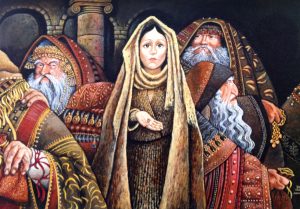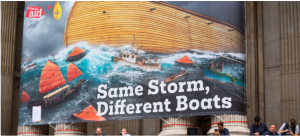Nerys writes: I wonder what you do to pass the time when you’re sitting amongst strangers in the doctor or dentist’s waiting room perhaps, or on a station platform? Do you like to notice things about those around you and try to guess what kind of people they are and what they do? People-watching is something I do regularly to amuse myself on my long train journeys back and forth to Wales. Jesus was a people-watcher and in our Gospel passages today, Mark 28-34 and 38-44, he uses what he sees to teach his disciples what it really means to love God with all our heart and our neighbour as ourselves.
It was almost time for the feast of Passover and Jesus had come to Jerusalem for the great celebration. He had been teaching in the temple and various religious men had been questioning him, some trying to catch him out, some genuinely wanting to understand. One of these, a teacher of the Law, is commended by Jesus for his wise response. ‘Love the Lord your God with all your heart’ was and is the most important rule in Judaism, spoken in prayer every day by the faithful. Jesus joins it with another important rule, ‘love your neighbour as you love yourself’. This is the great commandment of our faith.
Jesus had been people-watching during his time in Jerusalem. He had noticed the way some of the teachers of the Law behaved in the market place and in the synagogues and at feasts. He gives a stern warning about these people who were teaching the law of God to others but weren’t following it themselves. They weren’t loving God with all their heart and loving their neighbour as themselves. Instead, they were putting on a great show of being religious while cheating and stealing from the poor.
A little later, Jesus was people-watching again in the courtyard in the temple where the jars of offering stood – thirteen large trumpet-shaped collection boxes lined up against the wall. He draws a contrast between the rich men who make a show of giving large amounts and a poor widow who has only two small coins, claiming that she put more in the offering box that all the others. What a strange thing to say! But this is not a story of money. ‘It is about what we are willing to give of ourselves,’ said artist James Christensen whose painting ‘The Widow’s Mite’ uses striking light and dark to symbolize spiritual and worldly power. The poor widow, who gave all she had, glows with an inner light. Even her ragged clothing is luminescent. By contrast, the rich men in their expensive robes fade into the shadows behind this woman’s radiance.

Jesus, looking through the eyes of love, saw that the rich were giving just a very small part of what they had whilst the woman gave everything, leaving her with nothing for herself. We are not told why she did it but it certainly wasn’t for show like the rich people. Could it be that she did it out of love for God? The total love that the commandment demands, a love that calls for total trust. The love and trust which Jesus showed when he allowed himself a few days later to be arrested, punished and killed before rising again from the dead. I wonder if this is why Jesus drew his disciples’ attention to what he’d seen in the temple courtyard that day.
What if Jesus was among us today doing his people-watching. What would he see?
What if he was in Glasgow among the delegates of the COP 26 conference, those from the rich countries like the United Kingdom and those from the global south which are already suffering because of the climate crisis. Who would he commend and who would he condemn?
A new giant artwork is hanging from the front columns of St Paul’s Cathedral this week to highlight the disparity between the rich and the poor. It is the image of an ark surrounded by smaller more vulnerable boats. “We’re in the same storm, but different boats,” said Amanda Khozi Mukwashi, the CEO of Christian Aid. “If the UK has an ark, then those on the frontline of the climate crisis don’t even have lifeboats.”

Richer nations are the main contributors to the climate emergency and also have the means to be able to better protect themselves from its effects. Meanwhile, many poorer countries such as Kenya and Bangladesh are already experiencing climate chaos with little means to protect themselves and their communities.
This is deeply unjust but the COP 26 climate summit this week is an opportunity for change. It is an opportunity for our leaders to act justly, to love our global neighbours as they love themselves. You may wish to make this Christian Aid prayer your own:
Loving Lord, we pray for our leaders who gather together at COP26. Bless them with compassion, wisdom, and hope, that they may work together to take action against the climate crisis. Fill their hearts with your love for all of creation. Open their minds to the calls of the people most affected by the climate crisis. Clear their hearts of sinful ways which endanger your creation. Bless their minds with actions so they may be sowers of creation, not destruction. Lead them to be champions for climate justice, both at COP26 and beyond. Amen






